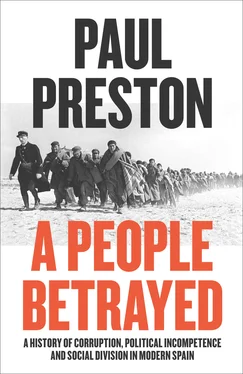Alfonso XII complained to the German envoy that Cánovas ‘knows everything, decides everything and interferes in everything, even in military matters of which he knows nothing and that he gives no consideration to the King’s views and wishes’. He believed that Cánovas was using funds that were needed to modernize the army’s weaponry in order to fortify harbours because there were more opportunities for graft in construction. On 25 November 1885, Alfonso died, aged just twenty-seven. Apparently, Cánovas had been made aware of the seriousness of the King’s condition by his doctor, who had told him that a warmer climate would probably prolong Alfonso’s life. However, he had sworn the doctor to secrecy lest news of the King’s weakness inflame the republican movement.8 His wife María Cristina became Queen Regent and some months later gave birth to a child, the future Alfonso XIII. To ensure that the system established by Cánovas would endure, the two party leaders met at the Palace of the Pardo and signed a pact that consolidated the so-called turno .
In the south, land hunger was creating an increasingly desperate desire for change, the more so as Andalusian labourers came under the influence of anarchism. This was partly the consequence of the fact that, in November 1868, Giuseppe Fanelli, an Italian disciple of the Russian anarchist Mikhail Bakunin, had been sent to Spain by the First International. His oratory found fertile ground and soon inspired his own evangelists to take anarchism to village after village. Part of the message was that alcoholism, the frequenting of prostitutes and gambling were degrading. Alongside the advocacy of austerity, Fanelli also argued that justice and equality should be seized by direct action. This struck a chord among the starving day labourers or braceros and gave a new sense of hope and purpose to hitherto sporadic rural uprisings. Fanelli’s eager converts took part in outbreaks of violence, crop burnings and strikes. However, poorly organized, these revolutionary outbursts were easily crushed and alternated with periods of apathy.9
Commenting in 1910 on why revolution was slow in developing, Rafael Shaw wrote:
The patient submission of the labourer to conditions which he believes to be unalterable is partly the result of three hundred years of corrupt government, during which he has been steadily squeezed to provide money for the wars, luxuries, and amusements of the governing classes; partly of the terror of the Inquisition and the tradition of silence that it has left behind it; partly of Oriental fatalism; but is certainly not due to the animal indifference and stupidity to which his ‘betters’ attribute it. The peasant refrains from open complaint, not because he is contented and has nothing to complain of, but because long experience has taught him the uselessness and the danger of protest. He may offend his employer and lose his place, or, still worse, he may offend the Church and the Jesuits, in which case he will be a marked man, and can never hope to get permanent employment again.
Another reason for the lack of protest against the ease with which corruption dominated the political system was that, at the turn of the century, around 75 per cent of the population was illiterate. Thousands of villages had no school at all. Even in Madrid and Barcelona, there were fewer than half of the schools required by law. Where there were schools, attendance was not imposed and schoolteachers were poorly paid and often not paid at all. Rudimentary literacy skills were taught in the army.10 At first, hunger and injustice had found their champions in the banditry for which the south was notorious, but the day labourers had not been long in finding a more sophisticated form of rebellion.11 When they came, the inevitable outbreaks of protest by the unrepresented majority were repressed violently by the forces of order, the Civil Guard and, at moments of greater tension, the army.
The owners of the great estates, unwilling to engage in artificial fertilization or expensive irrigation projects, preferred instead to build their profits on the exploitation of the great armies of landless day labourers, the braceros and jornaleros .12 The latifundios were usually administered by bailiffs, who took every advantage of a mass of surplus labour. When seasonal work was available, the braceros and jornaleros were obliged to work long hours, often from sun-up to sun-down. Work was often available only far from home which meant having to sleep in insanitary huts provided by the landowners. The labourers endured harsh working conditions on starvation wages and lengthy periods of unemployment. When the more easy-going clerics and nobles of an earlier age sold up and the common lands were enclosed, most of the social palliatives which had alleviated rural misery were curtailed. The encroachment on the lands of religious orders or the sleepier aristocrats saw the collection of windfall crops or firewood, the occasional hunting of rabbits or birds, the watering of domestic animals, which had hitherto kept the poverty-stricken south from upheaval, come to an end. Paternalism was replaced by repression. Thus was intensified the process of the proletarianization of a great army of landless labourers. The powder keg of resentment was kept in check by the institutionalized violence of the Civil Guard and armed thugs hired by the bailiffs.
Other devices were used, such as conspiracies fabricated or wildly exaggerated in order to justify the repression of the principal working-class organization, the FTRE. Its weekly journal, the Revista Social , was subject to censorship and occasional confiscation. In the last week of September 1882, the FTRE’s second congress was celebrated in Seville. A total of 209 sections and nearly 50,000 members were represented, mainly from Andalusia (30,000) and from Catalonia (13,000). The FTRE was portrayed by the authorities as a band of bloodthirsty revolutionaries. In fact, the organization’s immediate objective was the eight-hour day and its long-term ambition the collectivization of agriculture and industry. However, this relative moderation was undermined by the fact that members of the FTRE were being discriminated against by landowners and industrialists. In numerous towns, the alcaldes banned public meetings and the Civil Guard treated private ones as subversive. Accordingly, a breakaway group, Los Desheredados, advocated secret revolutionary action and the use of terrorism.13
A drought in the summer of 1881 led to crop failures across Andalusia but especially in the provinces of Cadiz and Seville. The consequent hunger the following winter saw landless labourers and their families begging in the streets of the towns. There were dramatic increases in the number of deaths from malnutrition and related illnesses such as measles, particularly among children. There were violent attacks on property, crop burning and sheep rustling, thefts from bakeries and other food shops and cases of banditry.14 There were some towns where the authorities vainly tried to raise funds to ameliorate the predicament of the starving labourers and isolated incidents of charitable donations for the poor. In some cases, municipal resources were used to finance road mending or irrigation projects to give work to the unemployed. More often, however, labourers were simply advised to seek work in other provinces. By the autumn of 1882, social tension had intensified notably. A wave of strikes was met by heavy-handed repression at the hands of a substantially reinforced Civil Guard. In Jerez, there were demonstrations by labourers demanding work which soon degenerated into food riots. In December 1892, four murders were registered in the area.15 The panic-stricken authorities seized the opportunity to claim that the killers in Jerez and the perpetrators of numerous other unconnected crimes, brawls and robberies belonged to the Mano Negra (Black Hand), a name referring to the dirty hands of manual labourers. The Mano Negra was said to be conspiring to avenge the crimes committed against the working class by the landowners. Allegedly, it aimed to wage war on the southern rich by means of murder, kidnappings and robbery. Furthermore, it was claimed that this secret organization had over 70,000 members. In this context, many workers were imprisoned on the basis of denunciations by a landlord, a magistrate or a Civil Guard, without any need for proof.
Читать дальше












